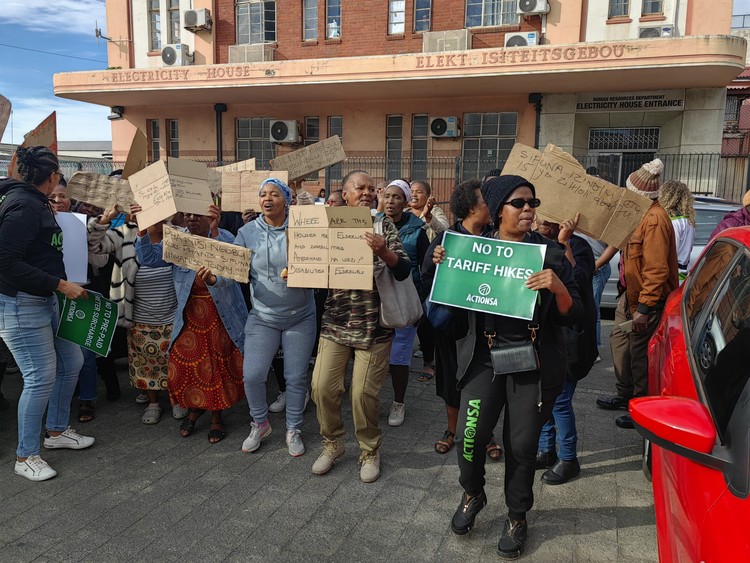Buffalo City ratepayers march to City Hall, rejecting electricity fee
A monthly maintenance network surcharge of between R376 and more than R700 came into effect on 1 July
Protesters marched to East London City Hall on Wednesday, demanding that the Buffalo City mayor withdraw a recent electricity maintenance fee. Photo: Johnnie Isaac
- Ratepayers from 50 wards in Buffalo City Metro marched to East London City Hallon Wednesday to try to persuade the mayor not to increase electricity tariffs.
- As of 1 July, households are paying a 12% electricity tariff hike, coupled with a monthly maintenance network surcharge of between R376 and R760.
- Many ratepayers are complaining that the new tariffs are unaffordable and place more financial strain on poor and working-class households.
About 200 people from 50 wards under Buffalo City Metro marched to the municipality’s offices at the East London City Hall on Wednesday to try to persuade the mayor not to introduce a maintenance fee.
As the municipality’s four-month “free pass” for residents who used electricity through illegal connections by tampering with their meters also came to an end, the new tariffs kicked in last week. Households are now paying a 12% electricity tariff hike, coupled with a monthly maintenance network surcharge of between R376 and R760.
Many ratepayers are complaining that the new tariffs are unaffordable and place more financial strain on poor and working-class households.
On Wednesday, protesters handed over a memorandum of grievances and a petition to Mayor Princess Faku.
March organiser Leonard Ncumbese said that municipal officials often refused to provide residents with detailed breakdowns of their bills, leaving consumers in the dark about how they accrued large debts.
Sandra Schroeder, of the social housing provider Own Haven Housing Association, said the additional service fee was detrimental to non-profit organisations providing affordable rentals for low-income earners.
She explained that their organisation would need to pay an additional R500,000 a month due to the lack of special tariff provisions for social housing in Buffalo City. She said they receive special provisions in metros like the City of Cape Town and Nelson Mandela Bay, where they also operate.
“Our tenants cannot afford the R432 service fee that Buffalo City is charging. Our tenants are already struggling, and we cannot recover this cost from them, meaning it will come out of our pockets,” said Schroeder.
DA councillor and caucus leader in the city council, Sue Bentley, has written to Eastern Cape Finance MEC Mlungisi Mvoko, through DA Shadow Finance MEC Dr Macom Figg, to express her concerns about the lack of public participation in the budget.
“We don’t believe there was meaningful public participation in the budget process, which is illegal. We want the Finance MEC to investigate because the budget process was flawed, and therefore these increases are also flawed,” Bentley added.
Jerome Mdyolo, the Eastern Cape leader of Al Jama-ah, accused the metro of violating the Municipal Financial Management Act and the Municipal Systems Act, which mandates citizen consultation before the council passes the budget.
Outside City Hall, protesters demanded to see Mayor Faku, but she was not available. Buffalo City Metro spokesperson Samkelo Ngwenya said that Faku declined to meet the protesters to avoid being humiliated.
He said that the metro is conducting roadshows and visiting wards to explain the new tariffs while assisting individuals and businesses. “We have provisions for households with incomes of up to R4,400 per month, including elderly rebates and packages for senior citizens and businesses. We are going ward to ward to convince people to avoid unnecessary rate boycotts,” said Ngwenya.
Protesters warned that they would disrupt mayoral events until she met with them.
Support independent journalism
Donate using Payfast

Don't miss out on the latest news
We respect your privacy, and promise we won't spam you.
Next: Gale rips off roofs in Cape Town suburb
Previous: Appeal Court rules that City of Cape Town acted unlawfully
© 2024 GroundUp. This article is licensed under a Creative Commons Attribution-NoDerivatives 4.0 International License.
You may republish this article, so long as you credit the authors and GroundUp, and do not change the text. Please include a link back to the original article.
We put an invisible pixel in the article so that we can count traffic to republishers. All analytics tools are solely on our servers. We do not give our logs to any third party. Logs are deleted after two weeks. We do not use any IP address identifying information except to count regional traffic. We are solely interested in counting hits, not tracking users. If you republish, please do not delete the invisible pixel.

